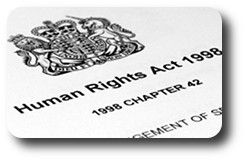Sunday 1 November, 12.30pm until 1.30pm, Henry Moore Gallery Lunchtime Debates
 The Human Rights Act 1998 enshrines in UK law the articles of the European Convention for the Protection of Human Rights and Fundamental Freedoms, which guarantees numerous individual rights, from the right to a fair trial to freedom of assembly. While most people support these things in principle, critics object to the Act on several grounds. Many are concerned that the convention weakens our capacity to deal effectively with crime and terrorism, while others object that the Act encourages a litigious culture, by codifying dubious entitlements. Some feel that making British law subject to a convention originating outside the country undermines national sovereignty, and have proposed a Bill of Rights to be drawn up in Britain itself, reflecting real public concerns. Still others believe the problem is that the Human Rights Act gives too much power to judges and lawyers at the expense of elected and accountable politicians. Supporters of the Act say that despite any imperfections, it does more to protect liberty than any alternative, and that without it our human rights would not be protected.
The Human Rights Act 1998 enshrines in UK law the articles of the European Convention for the Protection of Human Rights and Fundamental Freedoms, which guarantees numerous individual rights, from the right to a fair trial to freedom of assembly. While most people support these things in principle, critics object to the Act on several grounds. Many are concerned that the convention weakens our capacity to deal effectively with crime and terrorism, while others object that the Act encourages a litigious culture, by codifying dubious entitlements. Some feel that making British law subject to a convention originating outside the country undermines national sovereignty, and have proposed a Bill of Rights to be drawn up in Britain itself, reflecting real public concerns. Still others believe the problem is that the Human Rights Act gives too much power to judges and lawyers at the expense of elected and accountable politicians. Supporters of the Act say that despite any imperfections, it does more to protect liberty than any alternative, and that without it our human rights would not be protected.
How has the Human Rights Act contributed to the wider debate about liberty? Has the codification of certain freedoms in the statute books galvanised or restricted society’s idea of freedom? Is the human rights movement still effective in preserving human dignity, or is it now just a nice little earner for altruistic lawyers and NGOs? Have legal appeals taken the place of political activism? What is next for the debate on freedom and does the Human Rights Act have a place?
 | Jean Candler head of policy and public affairs, British Institute of Human Rights |
 | Jonathan Cooper human rights barrister, Doughty Street Chambers; editor, European Human Rights Law Review |
 | John Fitzpatrick professor of law and director, Kent Law Clinic, University of Kent, Canterbury |
 | Joshua Rozenberg legal commentator; columnist and blogger, Standpoint; columnist, Law Society Gazette; presenter, BBC Radio 4 |
| Chair: | |

|
Luke Gittos
criminal lawyer; director of City of London Appeals Clinic; legal editor at spiked; author, Why Rape Culture is a Dangerous Myth: From Steubenville to Ched Evans |
John Cooper is a member of the criminal and human rights Bar and is considered one of the leading barristers in London. He was recently nominated as Human Rights Barrister of the Year. John spoke to trainee barrister and Battle of Ideas committee member, Luke Gittos.
Luke Gittos & John Cooper, Independent Independent Minds, 19 November 2009Instead of binning this maligned legislation, David Cameron should embrace it. It is thoroughly Conservative – our own bill of rights.
Peter Oborne, Guardian Comment is free, 5 October 2009 Moving on the human rights debate
Moving on the human rights debate
Are human rights still the best mechanism for ensuring personal freedom, or are they now so insinuated into state institutions that they have lost their power to be subversive?
Luke Gittos, Culture Wars, 19 June 2009 Why human rights are wrong
Why human rights are wrong
As the Universal Declaration of Human Rights turns 60, many seem unsure whether to criticise Western governments for breaching it or to urge them to enforce it. The end result is that our understanding of rights has become degraded.
Philip Hammond, spiked, 25 December 2008"In too many cases it has become close to impossible to deport foreign nationals that may pose a threat to the UK. It is wrong to undermine public safety by allowing the human rights of dangerous criminals to fly in the face of common sense."
Graeme Wilson, Daily Telegraph, 13 May 2006
The issue of human rights is becoming part of our everyday lives, though public perception of what it means can often still remain hazy
Jason Bennetto, Guardian